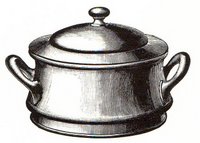 Today, April 18th …
Today, April 18th …Members of the New York City Press Club held a dinner for Charles Dickens at Delmonico’s on this day in 1868. Male members of the club, that is. Female journalists were refused tickets, public banquets being for men only. The club did most generously offer the ladies eating behind a curtain, but it seems they were not impressed, and the event triggered the gradual development of women-only clubs.
The two hundred men sat down to a “Feast of Reason and a Flow of Soul”, and the following menu.
MENU
Huitres.
Potages.
Consommé à la Sevigné, Crème d’asperges
Hors d’Oevres.
Les petites Tim-balles à la Dickens
Poissons.
Truites à laVictoria; Pass (?) à la Italienne.
Releves.
Fillet de boeuf à la Lucullus; Agneau farci à la Walter Scott.
Entrees.
Filets de Brants à la Signora; Croustade de ris de veau à l’Anglaise; Cotelettes à la Fenimore Cooper; Galantine à la Royale; Aspics de foie gras histories.
Sorbets
A l’Americaine.
Rotis.
Becassines, poulets de graine truffes.
Entremets.
Tomates, petits pois, artichautes, laitues braisees.
Sucres.
Soupirs à la Mantilini, macedoine de fruits, Moscovates a l’Abricots, gelees au kumel, gateaux savarins et Viennois, glaces a l’orange, glaces variees.
Fruits et desert.
PIECES MONTEES.
Temple de la literatture, Trophee a l’auteur, Stars and Stripes, Pavillon International, Armes britanniques, La loi du destin, Monument de Washington, Colonne Triumphale.
Temple de la literatture, Trophee a l’auteur, Stars and Stripes, Pavillon International, Armes britanniques, La loi du destin, Monument de Washington, Colonne Triumphale.
Recipes from Eliza Acton are this week’s theme, but it would be appropriate to include one of her recipes here in any case, because, although they do not appear to have met, she and Dickens were aware of each others work on social issues.
This is how she might have cooked the lettuce for him:
This is how she might have cooked the lettuce for him:
STEWED LETTUCES.
Strip off the outer leaves, and cut away the stalks; wash the lettuces with exceeding nicety, and throw them into water salted as for all green vegetables. When they are quite tender, which will be in from twenty to thirty minutes, according to their age, lift them out and press the water thoroughly from them; chop them a little, and heat them in a clean saucepan with a seasoning of pepper and salt, and a small slice of butter; then dredge in a little flour and stir them well; add next a small cup of broth or gravy, boil them quickly until they are tolerably dry, then stir in a little pale vinegar or lemon-juice, and serve them as hot as possible, with fried sippets round them.
Tomorrow: Just like the Real Thing.
Tomorrow: Just like the Real Thing.
Above and Beyond ...
A selection of Eliza'a recipes, including the first known recipe for Bakewell Pudding, are here.
Quotation for the Day ...
By reason of its soporigous quality, lettuce ever was, and still continues the principal foundation of the universal tribe of Sallets, which is to cool and refresh, besides its other properties ... including beneficial influences on morals, temperance, and chastity. John Evelyn, Acetaria: A Discourse of Sallets (1699)Quotation for the Day ...
Dear Old Foodie,
ReplyDeleteJust discovered You, thanks to Edible Tulip, and I am just thrilled to the max!!!
No time to write more... have to read all your entries. My life just improved!!!
Love,
Sara (too lazy to have her own blog)
Dear Sara
ReplyDeleteThankyou for the kind comment, I am delighted to have improved your life, but suspect that you are exaggerating somewhat! I thought I was too technically inept to have my own blog, but I somehow seemed to have managed it .... there is something about having enthusiastic readers that is going to make it impossible for me to be lazy now ....
Where...what... HOW do you do this? Are you some curator in some museum, or a librarian in some archive? Where in the world do you get your information?! It astounds me.
ReplyDeleteEliza sure cooked the life out of her vegetables, didn't she? LOL Tastes have sure changed, but DH reminded me that there was no refrigeration back then and they probably overcooked everything to kill any type of bacteria. Could be.
Anyway, great post. Oh, and thanks for the link to Joe Pastry!
Alexander Pope resets? Huzzah!
ReplyDeleteDear Sally
ReplyDeleteI am an enthusiast with a longstanding hobby, that is all. I think that in regard to the cooking of veges "in the Olden Days" that what we tend to forget is that they were often tougher than they are today - we have much improvement and tenderisation of veges since then, thanks to our growers.
And - I am intrigued. Do you know Joe Pastry personally, or are you one of his admirers too?
Dear Fesser - I misunderstand the reference to Alexander Pope. Am I missing a good culinary story? Do please enlighten me.
O.F. - No, I just found Joe through your site, and am I ever glad I did! Love his humerous writing and his informative posts. Ain't the net grand? LOL
ReplyDelete